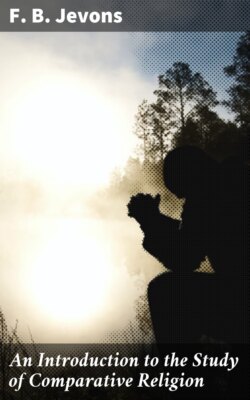Читать книгу An Introduction to the Study of Comparative Religion - F. B. Jevons - Страница 8
На сайте Литреса книга снята с продажи.
PRAYER
ОглавлениеTable of Contents
Prayer is a phenomenon in the history of religion to which the science of religion has devoted but little attention—the reason alleged being that it is so simple and familiar as not to demand detailed study. It may, however, be that the phenomenon is indeed familiar yet not simple. Simple or not, it is a matter on which different views may be held. Thus though it may be agreed that in the lower forms of religion it is the accomplishment of desire that is asked for, a divergence of opinion emerges the moment the question is put, Whose desire? that of the individual or of the community? And instances may be cited to show that it is not for his own personal, selfish advantage alone that the savage always or even usually prays. It is the desires of the community that the god of the community is concerned to grant: the petition of an individual is offered and harkened to only so far as it is not prejudicial to the interests of the community. The statement that savage prayer is unethical may be correct in the sense that pardon for moral sin is not sought; it is incorrect, if understood to mean that the savage does not pray to do the things which his morality makes it incumbent on him to do, e.g. to fight successfully. The desires which the god is prayed to grant are ordinarily desires which, being felt by each and every member of the community, are the desires of the community, as such, and not of any one member exclusively.
Charms, it has been suggested, in some cases are prayers that by vain repetition have lost their religious significance and become mere spells. And similarly it has been suggested that out of mere spells prayer may have been evolved. But, on the hypothesis that a spell is something in which no religion is, it is clear that out of it no religion can come; while if prayer, i.e. religion, has been evolved out of spells, then there have never been spells wholly wanting in every religious element. Whether a given formula then is prayer or spell may be difficult to decide, when it has some features which seem to be magical and others which seem to be religious. The magical element may have been original and be in process of disappearing before the dawn of the religious spirit. Now, the formula uttered is usually accompanied by gestures performed. If the words are uttered to explain the gesture or rite, the explanation is offered to some one, the words are of the nature of a prayer to some one to grant the desire which the gesture manifests. On the other hand, if the gestures are performed to make the words more intelligible, then the action performed is, again, not magical, but is intended to make the words—the prayer—more emphatic. In neither case, then, is the gesture or rite magical in intent. Dr. Frazer's suggestion that it required long ages for man to discover that he could not always succeed—even by the aid of magic—in getting what he wanted; and that only when he made this discovery did he take to religion and prayer, is a suggestion which cannot be maintained in view of the fact that savage man is much more at the mercy of accidents than is civilised man. The suggestion, in fact, tells rather against than in favour of the view that magic preceded religion, and that spells preceded prayer.
The Australian black fellows might have been expected to present us with the spectacle of a people unacquainted with prayer. But in point of fact we find amongst them both prayers to Byamee and formulæ which, though now unintelligible even to the natives, may originally have been prayers. And generally speaking the presumption is that races, who distinctly admit the existence of spirits, pray to those spirits, even though their prayers be concealed from the white man's observation. Gods are there for the purpose of being prayed to. Prayer is the essence of religion, as is shown by the fact that gods, when they cease to be prayed to, are ignored rather than worshipped. Such gods—as in Africa and elsewhere—become little more than memories, when they no longer have a circle of worshippers to offer prayer and sacrifice to them.
The highest point reached in the evolution of pre-Christian prayer is when the gods, as knowing best what is good, are petitioned simply for things good. Our Lord's prayer is a revelation which the theory of evolution cannot account for or explain. Nor does Höffding's "antinomy of religious feeling" present itself to the Christian soul as an antinomy … 138–174
